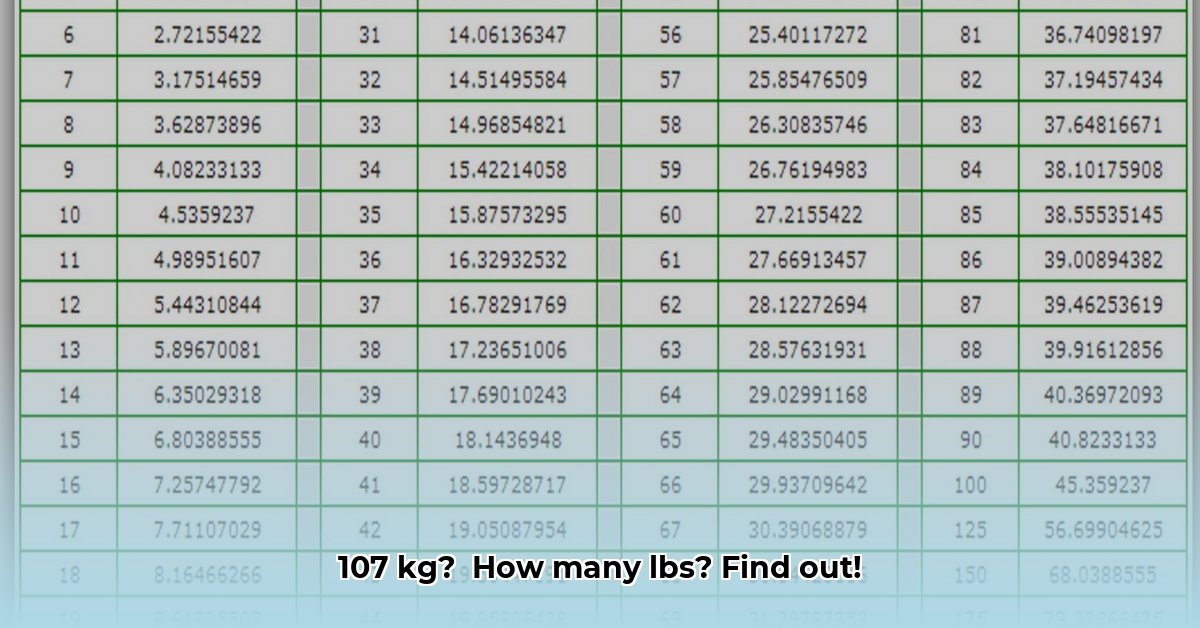Conversion Result
107 kg = 235.89 lbs (approximately)
107 kg = 235.894621 lbs (precisely)
Conversion Details
Formula: lbs = kg * 2.20462262
Units:
- Kilogram (kg): The base unit of mass in the International System of Units (SI), commonly called the metric system.
- Pound (lb): A unit of mass used in the imperial and US customary systems. It is legally defined as 0.45359237 kilograms.
Conversion Table
| Kilograms (kg) | Pounds (lbs) |
|---|---|
| 105 | 231.49 |
| 106 | 233.47 |
| 107 | 235.89 |
| 108 | 238.32 |
| 109 | 240.74 |
Mental Math Tip
To quickly estimate kg to lbs, multiply by 2.2. For example, 107 kg * 2.2 ≈ 235.4 lbs. This approximation is usually sufficient for everyday purposes.
Why Convert Between Kilograms and Pounds?
The need to convert between kilograms and pounds arises from the continued use of two different measurement systems: the metric system (which uses kilograms) and the imperial/US customary systems (which use pounds). This difference can cause confusion in various scenarios, including:
- International Trade and Shipping: Products manufactured and shipped between countries using different measurement systems require accurate conversions to ensure proper labeling, pricing, and logistical handling.
- Scientific Research and Data Analysis: Scientific data is often shared and compared internationally, necessitating conversions to ensure consistency and allow for meaningful analysis.
- Personal Health and Fitness: Individuals tracking their weight or following fitness programs may encounter information expressed in either kilograms or pounds, making conversion necessary for personal understanding and application.
- Recipe Conversions and Cooking: Recipes originating from different parts of the world may use different units for ingredient measurements. Accurate conversion is essential for replicating recipes correctly.
- Travel and Baggage Allowances: Airlines typically specify baggage weight limits in either kilograms or pounds, depending on their country of origin. Travelers need to understand these limits in their familiar unit of measurement to avoid extra fees.
Mass vs. Weight: A Clarification
While often used interchangeably, “mass” and “weight” are distinct concepts in physics. Mass refers to the amount of matter in an object, while weight refers to the force exerted on an object due to gravity. Mass remains constant regardless of location, while weight can change depending on the strength of the gravitational field. So, while a 107 kg object would have a different weight on the moon than on Earth, its mass would remain 107 kg.
The Evolving Definition of the Kilogram
It is important to acknowledge that our understanding of measurement standards is constantly evolving. Metrologists are continually working to refine definitions and improve accuracy. Historically, the kilogram was defined by a physical artifact, a platinum-iridium cylinder stored in France. However, this standard was susceptible to minute changes over time. Since 2019, the kilogram is defined in terms of fundamental constants of nature, specifically Planck’s constant. This new definition provides greater stability and precision, impacting scientific research and metrology, though the practical difference for everyday conversions is negligible. Ongoing research might lead to further refinements in the future, reflecting the ever-evolving nature of scientific understanding.
- Borosilicate Glass Food Storage Containers Bring Durable Safety To Your Kitchen - January 22, 2026
- Microwave Safe Glass Containers for Durable Everyday Food Prep - January 21, 2026
- Borosilicate Glass Containers Offer Superior Food Storage and Meal Prep - January 20, 2026










